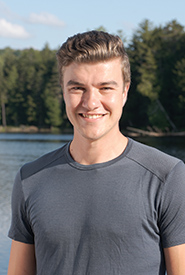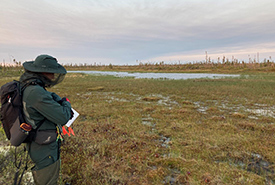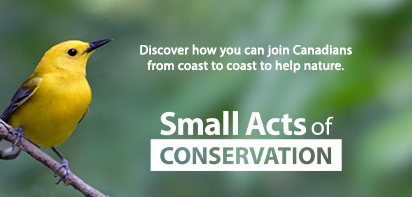
Justin Kreller (Photo by Guillaume Simoneau)
Justin Kreller
MSc student, Carleton University (2023–present)
Justin Kreller joined the Weston Family Conservation Science Fellowship Program at the Nature Conservancy of Canada (NCC) as a master’s student in September 2023. With a background in applied science and conservation technology, he hopes to provide NCC with valuable insight on conserving ecosystems, specifically focusing on the spread of invasive plants.
Justin grew up in Ottawa but, despite being raised in the city, the outdoors were always where he truly belonged.
“Many of my earliest and fondest memories involve spending time at our family cottage,” he says. “I remember catching tadpoles among slimy lily pads, picking raspberries by the roadside and roasting marshmallows over the fire. I also remember finding my first feather — a blue jay’s — and discovering my passion for birds at a fairly young age. It wasn’t long before I was gifted my first field guide and binoculars to continue exploring.”
Justin kept these memories close to his heart through high school, where he excelled in math and science. This led him to study biomedical mechanical engineering at the University of Ottawa, as it seemed like the perfect opportunity to combine his academic interests and passion for problem solving.
“In essence, engineering is applied science, meaning that engineers use scientific concepts to solve real-world problems,” says Justin. “This practical aspect seemed very appealing to me and eventually led to a desire to apply my critical thinking skills to the environmental field. After all, engineers solve problems, and nature is currently experiencing a multitude of them.”

Justin Kreller performing a point count (bird survey) on Atik Island on the Winisk River, Ontario. (Photo courtesy of Justin Kreller)
To this end, Justin enrolled in Fish & Wildlife Conservation Technician studies at Sault College. This experience allowed him to explore and appreciate his surroundings with a new perspective, notably through experiences as a student biologist in the National Capital Greenbelt and as a wildlife technician for the Ontario Breeding Bird Atlas.
“All that field work rekindled my love of the outdoors, but it also exposed me first-hand to the many ways that we humans have negatively affected landscapes,” he reflects. “I see beauty in things big and small, yet constantly witness ecosystems in distress, with habitats being fragmented or degraded by non-native, invasive species. I believe that it is our collective responsibility to rectify these issues we have created. That’s what drew me to research with the Nature Conservancy of Canada.
“In fact, non-native plant species are taking over and disrupting countless native ecosystems, with impacts being felt across society and the economy. These negative impacts get much worse over time, and even more accelerated with climate change, habitat loss and other threats. Even though it can seem pretty daunting, we know that the earlier and more proactively we act on this problem, the lesser impacts are likely to be. This is where my research comes into play.”
Specifically, Justin is using his computer skills to build simulations to predict the spread and future burden of Canada’s most invasive plants, like common reed and garlic mustard. Computers models are particularly useful tools in gaining insight on complex problems in relatively little time. Justin’s research will help NCC manage invasive plants and build more resilient landscapes across the country.
“I care very deeply about my research being useful and helping to make a difference in the world,” he says. “Partnering with NCC means that I will get to learn about hands-on conservation challenges and solutions directly from the people on the ground doing this work, which will in turn guide the scientific process for my project so that the outcomes of my master’s research will be more useful.”
Justin is supported by a highly skilled supervisory team in Emma Hudgins (University of Melbourne), Joseph Bennett and Lenore Fahrig (Carleton University), and Richard Schuster (NCC and Carleton University).
Outside of school and work, Justin can be found birding, camping, reading, enjoying music or walking his sweet German shepherd, Atlas.



